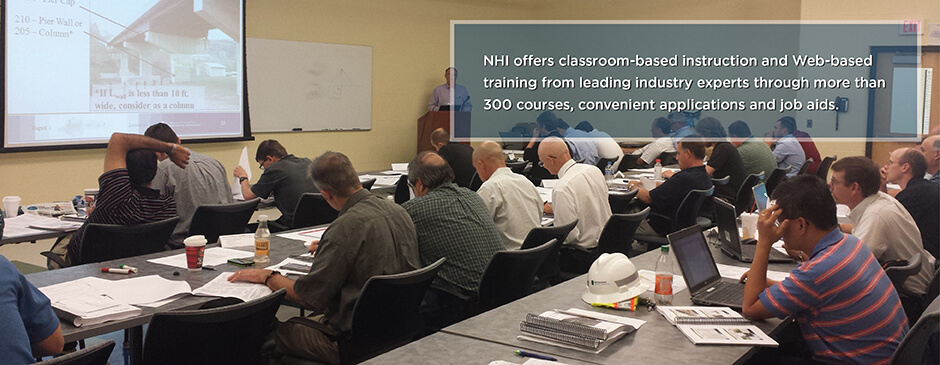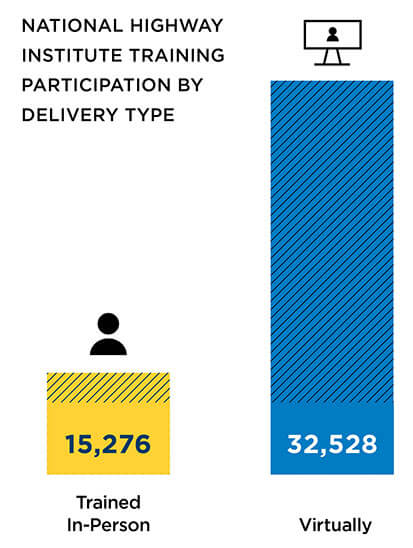U.S. Department of Transportation
Federal Highway Administration
1200 New Jersey Avenue, SE
Washington, DC 20590
202-366-4000
Office of Technical Services


As the training and education arm of FHWA, the National Highway Institute (NHI) has a rich history of innovation and expertise in delivering transportation training. Established by the U.S. Congress in 1970, NHI’s customers include State and Federal transportation personnel, local public transportation agencies, academics, and countless other industry organizations and professionals.
Today’s transportation workforce is often challenged by fragmented priorities and limited time and money. NHI’s relevant and resourceful training inventory helps budget-conscious professionals identify training solutions and uses innovative curriculum and delivery methods to build new skills and improve the job performance of America’s transportation leaders.
NHI offers classroom-based instruction and Web-based training from leading industry experts through more than 300 courses, convenient applications, and relatable job aids.
NHI experts determine the best and most flexible training solutions available to meet the needs of transportation professionals. Adult learning principles and industry best practices are used so participants leave the classroom with valuable new knowledge they can apply quickly. Training is delivered using some of the most innovative technologies available, and NHI relies on a development team of professional instructional designers to ensure each of its courses has a progressive and coordinated curriculum. Instructors are experienced professionals qualified to teach through NHI’s rigorous Instructor Certification Program, and are consistently rated an average of 4.6 out of 5 stars by NHI’s training participants.
NHI’s newly developed Instructor Development Course for Web-conference Training was based on the need for more flexibility in the delivery of instructor training. The course blends live, Web-conference training sessions with self-paced Web-based training. It uses NHI’s Web conferencing software to provide both new and experienced instructors with the knowledge and skills to deliver more effective online training. Participants leave the course prepared to make online training attention-grabbing and interactive.
FHWA received the International Association for Continuing Education and Training’s Innovation of the Year Award for Technology Integration for incorporating virtual bridge technology into course 130055, Safety Inspection of In-Service Bridges. The award recognizes the best of the best in technology integration and innovation. NHI also piloted two additional virtual bridges in its in-service bridge inspection course — a steel truss bridge over a railroad and a concrete tee beam bridge. Later in 2016, FHWA and NHI expanded on the virtual bridge technology to create course 130110, Tunnel Safety Inspection. This course uses virtual technology as an alternative to traditional field inspections. The capstone case study is a tunnel inspection that takes place in a computer-simulated, 3-D environment, exposing participants to a variety of conditions unlikely to be found during a single real-world inspection. The simulation also enables participants to demonstrate what they have learned without the time or expense required for traditional field trips.
Throughout 2016, NHI also focused on training agency employees to help them provide better administration and oversight of the Federal-aid Highway Program. NHI held 25 training sessions on Conducting Reviews, Writing Reviews, Risk-based Stewardship and Oversight, and Federal-aid 101 for FHWA division and Federal Lands units. Similarly, the NHI courses help the States administer the Federal-aid Program. The Contract Administration Core Curriculum training is one of NHI’s most popular courses and has been given 179 times since its inception in 2008.
NHI training helps support the changing transportation workforce and industry. While maintaining a focus on adult learning principles and national expertise, NHI continues to explore and employ new delivery methods that utilize emerging technology to increase the workforce’s access to training. Developing new content in smaller modules will make training more consumable to learners, and shorter learning activities can be taken out of broader context without losing importance. Blended learning formats like the flipped classroom will keep in-class learning more engaging and productive. The flipped classroom model prepares the learner to engage and apply the concepts of the training session through a variety of materials that are provided ahead of time virtually, saving valuable classroom time for discussions with the instructor, exercises or discussions. Looking ahead, NHI is excited about employing these new techniques in training development.